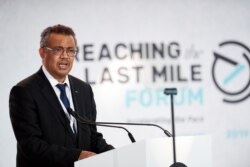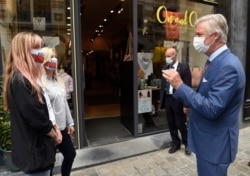Multiple countries in Europe eased some COVID-19 related restrictions Monday, in an effort to restart their economies while still being wary of the spread of the coronavirus.
The World Health Organization warned Monday that three key questions must be answered before any country can begin easing restrictions.
“First, is the epidemic under control?” Tedros Adhanom Ghebreyesus, Director-General of the WHO, said in a media briefing.
“Second, is the health care system able to cope with a resurgence of cases that may arise after relaxing certain measures? Third, is the public health surveillance system able to detect and manage the cases and their contacts, and identify a resurgence of cases?” he asked.
Tedros noted recent resurgences of cases in South Korea, Germany and China after they eased some restrictions.
After eight weeks of lockdown, France on Monday allowed people to go out without permits and let some shops reopen. Like in many areas, the approach is cautious, with bars, restaurants and theaters still closed.
Turkey reopened malls Monday, but anyone arriving to shop is being met with temperature checks and mandatory mask requirements along with capacity limits in stores.
Spain, Belgium and Greece also eased their restrictions Monday.
People are allowed to eat outdoors in Spain as of Monday, while some children in the Netherlands and Switzerland returned to school. Some states in Germany reopened gyms.
Russian president Vladimir Putin announced Monday that starting Tuesday the country would begin reopening its economy, resuming work at industrial plants and construction sites. Most businesses in the service industry, including hairdressers and non-food stores, will remain closed.
New Zealand, which instituted nearly five weeks of strict lockdown to prevent the spread of the virus, is set to further ease its restrictions Thursday, with people being allowed to go to restaurants, movie theaters and malls.
"So today I am announcing that cabinet agrees we are ready to move into Level 2. To open up the economy, but to do it as safely as possible,” Prime Minister Jacinda Ardern said Monday.
People will also be allowed to travel within the country again Thursday, while schools and bars will be allowed to reopen next week.
South Korea, which for weeks has had very low numbers of new infections, reported more than 30 new cases for the second day in a row Monday. Most of them were connected to an outbreak at nightclubs and bars in Seoul, but officials are worried about a re-emergence after efforts to bring the spread of the virus under control.
"Our top priority is to minimize the spread of the infections in the greater Seoul area," Prime Minister Chung Sye-kyun said.
Some measure of normal life is set to resume Tuesday in India with the country’s rail lines running again for the first time since late March. But India also reported its highest one-day increase in confirmed cases of COVID-19 on Monday, bringing the country’s total cases to over 67,000, according to Johns Hopkins University statistics.
The United States maintains the highest number of confirmed cases as well as the highest death toll related to COVID-19.
Worldwide, the number of confirmed coronavirus cases has surpassed 4.1 million. The global death tally is more than 282,000, according to Johns Hopkins University statistics.







